Related Research Articles
Pope Celestine II, born Guido di Castello, was head of the Catholic Church and ruler of the Papal States from 26 September 1143 to his death in 1144. He is the first pope mentioned in the prophecy of Saint Malachy.
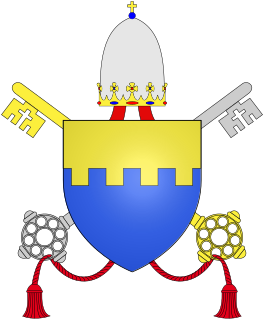
Pope Gregory X, born Teobaldo Visconti, was Bishop of Rome and hence head of the Catholic Church and ruler of the Papal States from 1 September 1271 to his death and was a member of the Secular Franciscan Order. He was elected at the conclusion of a papal election that ran from 1268 to 1271, the longest papal election in the history of the Catholic Church.
Pope Lucius III, born Ubaldo Allucingoli, reigned from 1 September 1181 to his death. Born of an aristocratic family of Lucca, prior to being elected pope, he had a long career as a papal diplomat. His papacy was marked by conflicts with Holy Roman Emperor Frederick I, his exile from Rome and the initial preparations for the Third Crusade.

Conrad of Wittelsbach was the Archbishop of Mainz and Archchancellor of Germany from 20 June 1161 to 1165 and again from 1183 to his death. He was also a cardinal of the Roman Catholic Church.
Boso was an Italian prelate and Cardinal of the Roman Catholic church.
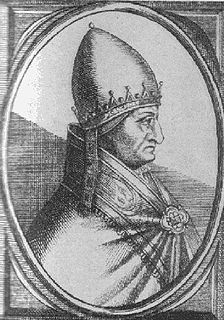
The 1268–1271 papal election, following the death of Pope Clement IV, was the longest papal election in the history of the Catholic Church. This was due primarily to political infighting between the cardinals. The election of Teobaldo Visconti as Pope Gregory X was the first example of a papal election by "compromise", that is, by the appointment of a committee of six cardinals agreed to by the other remaining ten. The election occurred more than a year after the magistrates of Viterbo locked the cardinals in, reduced their rations to bread and water, and removed the roof of the Palazzo dei Papi di Viterbo.
Gerardo Allucingoli was an Italian cardinal and cardinal-nephew of Pope Lucius III, who elevated him in 1182.

The Roman Catholic diocese of Bobbio was an Italian bishopric which existed from 1014 until 1986. The diocese was formed from the territory of the Abbey of Bobbio.

The Italian Catholic Diocese of Piacenza-Bobbio has existed since 1989. In northern Italy, it is a suffragan of the Archdiocese of Modena-Nonantola. The historic Diocese of Piacenza was combined with the territory of the diocese of Bobbio-San Colombano, which was briefly united with the archdiocese of Genoa.
Adelardo Cattaneo was an Italian cardinal and bishop. His first name is also listed as Alardo.
Theobald of Ostia was a French cardinal.
Pietro da Pavia, Can.Reg. was bishop-elect of Meaux (1171–1175), Cardinal-Priest of S. Crisogono (1173–1179) and finally Cardinal-Bishop of Tusculum. He was papal legate, together with Henri de Marsiac, in southern France against Cathars and Waldenses 1174–1178. He participated in the Third Lateran Council in 1179. Then he was sent again as papal legate to southern France and to Germany. He subscribed the papal bulls issued between October 14, 1173 and July 14, 1182. In 1180 he was elected archbishop of Bourges but it seems that he did not assume that post.
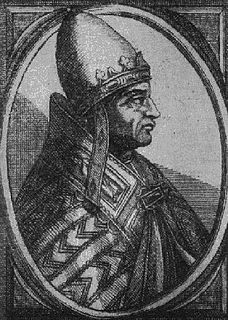
The October 1187 papal election was convoked after the death of Pope Urban III. It resulted in the election of Cardinal Alberto Sartori di Morra, who took the name of Gregory VIII.
Imar, O.S.B. Cluny was a French Benedictine abbot, who served as a bishop and cardinal.
Guido de Summa was an Italian Cardinal.
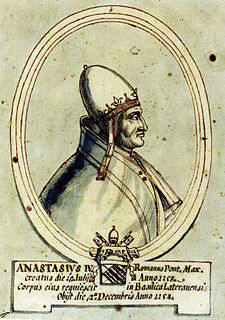
The 1153 papal election followed the death of Pope Eugene III and resulted in the election of Pope Anastasius IV.

The 1143 papal election followed the death of Pope Innocent II and resulted in the election of Pope Celestine II.

The 1144 papal election followed the death of Pope Celestine II and resulted in the election of Pope Lucius II.
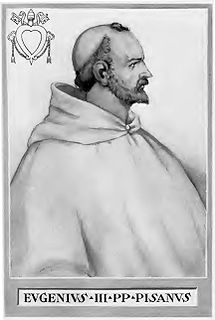
The 1145 papal election followed the death of Pope Lucius II and resulted in the election of Pope Eugene III, the first pope of the Order of Cistercians.

The 1181 papal election followed the death of Pope Alexander III and resulted in the election of Pope Lucius III. This was the first papal election celebrated in accordance with the decree Licet de evitanda discordia, promulgated in the Third Lateran Council in 1179, which established that the pope is elected by a majority of two thirds votes.
References
- ↑ Dondaine Hugues Ethérien et Léon Tuscus 1952 p. 115